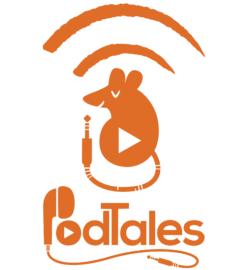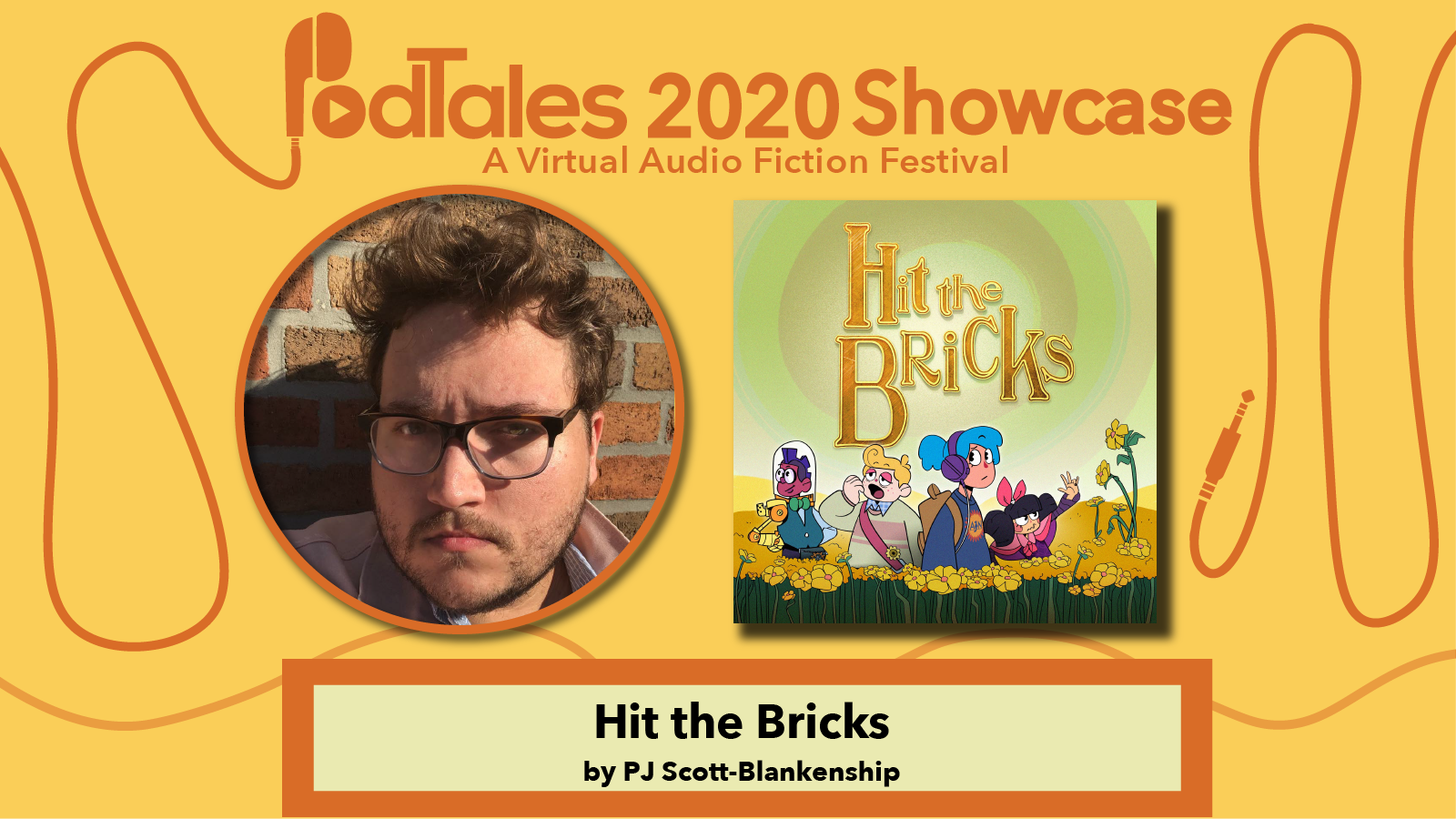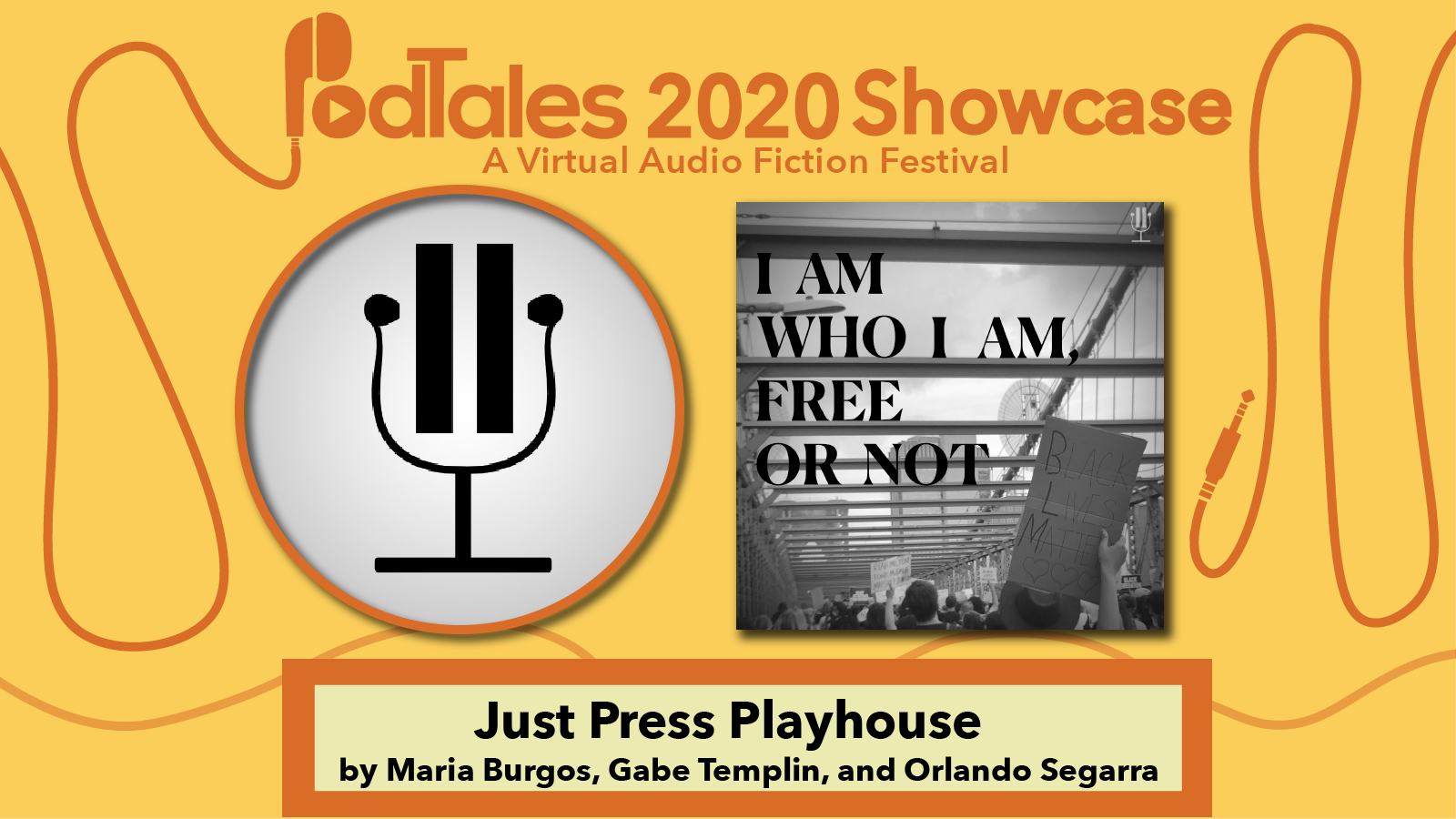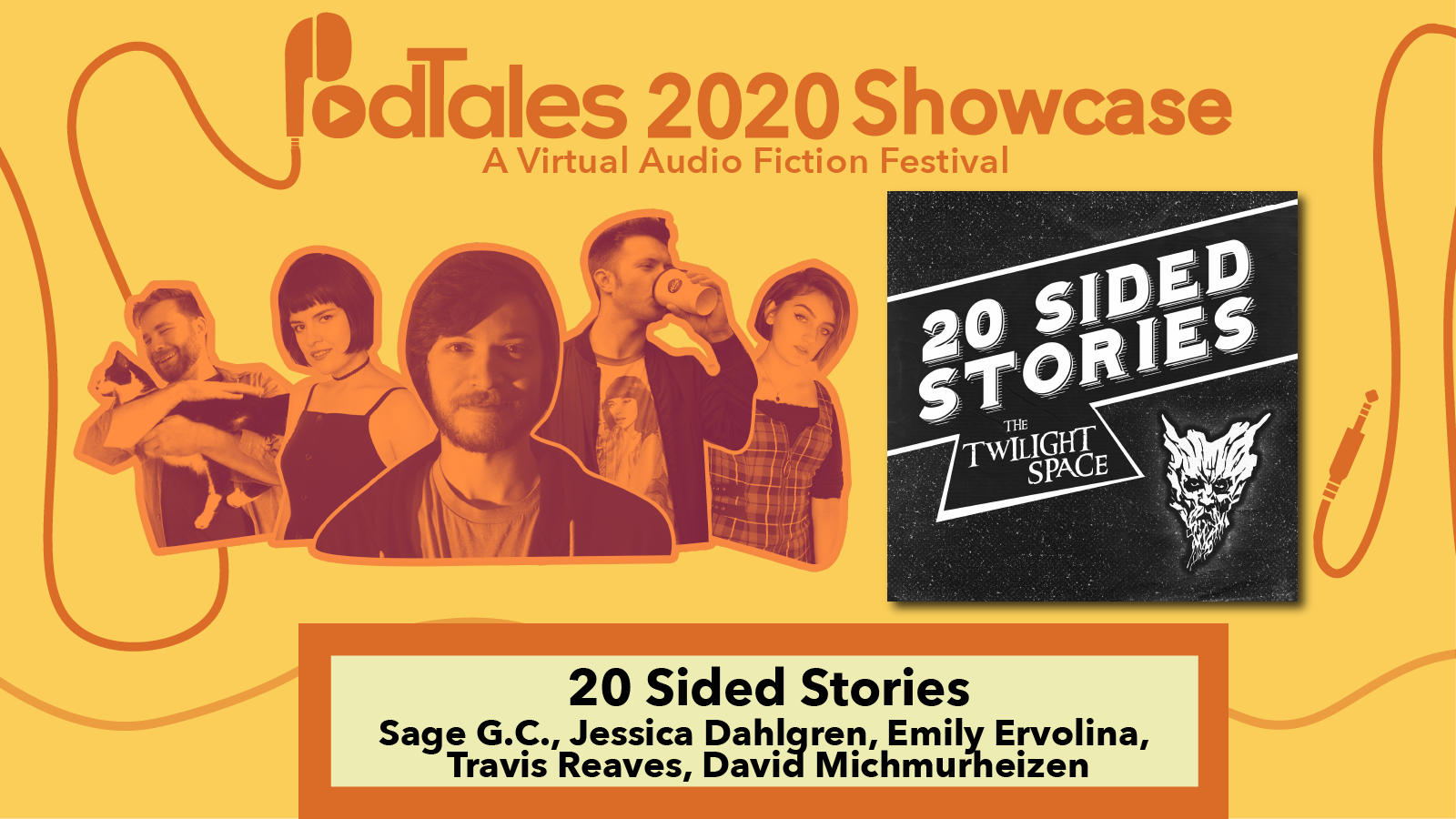Jeff Van Dreason
Hi, and welcome back to our third of these PodTales interview episodes. We listed some questions and put the call out to indie audio fiction creators to help us answer them. And in these episodes, we edit their answers together into what we hope will be a helpful montage. Before we get to today’s question. Let’s meet a handful of the wonderful creators who participated in this episode. I’ll give you a complete list in the credits at the end and also include information on them and their shows in the show notes.
JF Dubeau
Hello, I am JF Dubeau, and I am the writer for Achewillow.
Ann Slöan
Hey there, my name is Anne Slöan. She/her pronouns.
Chris Magilton
My name is Chris Magilton.
Ali Hylton
I name is Ali Hylton. I am the creator of the audio drama Dining in the Void.
Tamara Kissane
My name is Tamara Kissane.
Andrea Klassen
This is Andrea Klassen. I’m the showrunner of Me and AU.
Pippin Eira Major
Hi PodTales. I’m Pippin Eira Major.
Alex C. Telander
Alex C Telander of The Ostium Podcast.
Jeffrey Nils Gardener
This is Jeffrey Nils Gardener.
Cai Gwilym Pritchard
My name is Cai Gwilym Pritchard.
Tal Minear
My name is Tal Minear.
Jordan Stillman
Hi, my name is Jordan Stillman.
Sean Howard
Sean and Eli of Fable and Folly. *Crowd noise* Crowd goes wild! *Crowd noise*
Jeff Van Dreason
So here’s the question we asked for this episode: what’s your writing process? Do you work by yourself or with a team? If you’re not the only writer, how do you decide who writes what? How do you split up the work?
Tal Minear
My writing process varies from show to show. For Sidequesting, I am primarily just working by myself. I do an outline, do a draft, edit that draft, and record and produce it by myself.
Kyle Decker
So I run an actual play podcast. And you might think, “Well, that doesn’t involve a whole lot of writing.” But it does involve a lot of writing. It’s just different from say, if you were scripting something out. For actual plays, it’s really all about drawing that distinction between what do I want to improvise? And what do I want to have planned? While also knowing that your players have plans of their own and so you want to make sure that their plans are also involved as well.
Tamara Kissane
So my writing process is a little silly. When I started writing Me and AU, I basically put everything I thought I wanted to do in a spreadsheet. Because the show has a couple of different parallel plot lines. It has a plotline between this pair of friends and this pair of friends and this pair of more than friends, but also the plot of like a fake television show that’s running parallel to the main story.
David Orión Pena
Well, my writing process is kind of funny because, as it is a bilingual podcast, I usually write each episode first in one language and then in another and if you had to ask me which language, do I write it first? I don’t have a straight answer. Because it really depends on the episode on what I’m feeling about the episode. Sometimes I start first in English and in translate to Spanish.
Kyle Decker
So my process tends to be: I create a general outline of here’s what I want to happen. I put in the specific things that need to happen for the sake of a coherent narrative. Anything related to character or I think where a character moment might happen, I’ll go and talk to the player sometimes we’ll share explicit, like this is going to happen. And sometimes to kind of keep things vague and loose, I just get an idea of what do you want to happen? Where do you want the character to go?
Andrea Klassen
So being able to kind of block out everything I thought I might want to do early on meant that when I want to write episodes, I could kind of go into this spreadsheet and look at the different columns of the different plots, I was writing to go, oh, yeah, this would be a good time to check back in on this friendship. And that would tie in really nicely thematically with that thing I wanted to do involving that secret television reveal. I really just find like, for me mental mapping all of that junk out there really helps with that early construction phase.
David Orión Pena
It is actually pretty nice to be working in two languages because, let’s just say I write the episode in English, then I have to write in Spanish. And I use the English to translate. And usually at that point, I’m rewriting and I’m editing because some things are just like, Okay, this sounds good in English, but I don’t think I can really translate this in Spanish, or, Oh! I found a way to say this in Spanish in a really cooler way. So I’m just going to translate it back to English because that sounded better. So I do kind of a double editing there.
Kyle Decker
So once I figured out the outline and talk to the players, I do two more things. I make a list of truths in the world, even when I’m improvising. There are certain things that are true, either because I said them in the past or again because they’re important to the plot. So no matter what happens, I need to make sure that I adhere to these truths about the world. And then finally, I will write a monologue or two for something I’m uncomfortable with. For example, I’m not very comfortable doing location descriptions on the cuff. So I typically write those down.
David Orión Pena
I have one proofreader for English and one proofreader for Spanish and also the Spanish periphery there is kind of my antagonistic writer, I always ask him, Ángel Belmonte, Hi. If things make sense if I’m going a little bit out of credit, which usually isn’t, but I want to make sure if I’m telling too much, or I’m telling too little, which is also a problem.
Alex C. Telander
I do all the writing by myself and I like it that way. It’s a solitary life, but I have a strong will and determination. And I’m good at giving myself a schedule to follow. During the special year, I don’t always stick to that schedule. And I’m okay with that.
Cai Gwilym Pritchard
It’s just me pretty much why write episode by episode. And so I plan out, like overall plot is going to be and I know how things are going to end. And sometimes it will change as it goes along. If I decide something doesn’t make sense, or I don’t like the way things are going, which is quite useful.
JF Dubeau
Every season has its own story arc that spans roughly 15 episodes, and covers a handful of characters. These seasons are then of course, divided into these episodes, and each episode has its own arc.
Cai Gwilym Pritchard
I think, next season of the podcast, I’m probably gonna write like every episode, and then record so there’ll be a bit of a hiatus. So I think it will come up quite nicely.
JF Dubeau
Every character has its own arc throughout the theories throughout seasons, and it’s a lot of fun to work on. But it’s also a lot of work.
Chris Magilton
So far with Among the Stars and Bones, my process has tended to be to use note cards up on a wall, dividing the episode up into each of its component entries, and making general notes about what is happening from a, I guess plot point of view in each of those scenes, and what is happening from a personal or character point of view. But it’s still only very light notes at that point.
Ann Slöan
Over the three seasons that I’ve done, my process is that I start out very linearly, I write, I have eight episodes in my season. And I tend to write the first five one after the other. When I get to episode five, I feel compelled to write the finale, which is episode eight,
Chris Magilton
Then I usually write a flat out sprinted very fast draft. Initially I wrote two seasons back to back over the course of 21 days, a lot of it was absolutely terrible. But by the end of it, I had a lot more of a sense of the shape, individual characters, individual story arcs, and there was certainly a lot of things that change from those notes. To that point.
JF Dubeau
I write an outline of every season, they then submit and discuss with Amy, then I write every episode, submit those for edits, we go back and forth on key details, scenes and dialogue that doesn’t quite work well. Repeating words, certain phrases./
Ann Slöan
I just feel like I have enough episodes written at that point that it starts to inform the finale. I write the finale, and then I go back to episode six and seven. And once I have the whole season kind of written out, then I start going all over the place and rewriting so this, the process starts very linearly. And then turns out very nonlinear.
Chris Magilton
Um I am the only writer. But I do have my partner Devin Madsen, who is a novelist who works as my script editor. And I think it’s a really important part of the process to have that extra set of eyes for a number of reasons. And it’s got a lot to do with the fact that we work very differently. I tend to overwrite things quite a bit over explain. And Devin is much more succinct in the way that she writes in the way that she uses words. So she finds lots of ways to pare things down to more essential things to avoid repetition and an excess.
Tal Minear
For other shows. I’m not the only writer. For one of them, we’re splitting up who writes what on different sections. In another show. It’s a anthology show, so every episode is written by a different writer.
Tamara Kissane
So far, I’ve written two long audio pieces as a solo writer, which were essentially adaptations of staged theater pieces, but I prefer to write as a team, especially when working on projects that span a season or multiple seasons in episodic form.
Pippin Eira Major
As a writer, I work primarily by myself, but I do use others as a sounding board for creative decisions. I find it really hard to know if a stroy’s working without talking out first. I also find that, because a lot of the stories I write particularly mystery heavy, I sometimes start to feel too close to the work and I can no longer tell if I’m giving enough information to the audience at the right times, or if I maybe even given them too much.
Ali Hylton
Since I’m the creator of the show, I usually will write the outline first by myself. I’ll go over it with my production assistant and fellow writer Rowan Sparra will make changes to the outline, adjust whatever needs to be adjusted and then start writing the episodes.
Tamara Kissane
I’m writing with two teams right now on audio serials. And in both cases, we planned what we thought the season would look like together overall. With one team however, we sorted the episodes and each writer would write an entire episode individually. For the other team, all the writers worked on the same episode at the same time, throwing in notes or scenes that we felt compelled to write. So for me, the writing process is dictated by the personality and preferences of the writers in the group. And in both cases, all writers were actively engaged in making comments on the different documents. And then meeting regularly to discuss whether the real time writing was changing the trajectory of the season overall, which it almost always did.
Jordan Stillman
So the first season of the Ordinary Epic was written entirely by Brandon Crouse, and I did mostly script editing for that. But for season two, we’re actually splitting up the scripts. And so we’ll be writing together, some of the episodes I’ll be taking lead, some Brandon will be taking lead, and some we’ll be working more equally.
Pippin Eira Major
It can really help to talk it through. And to go over the main beats of the story with other people. Even if I don’t let them in on some of the big twists, I can make a sort of checklist for all the important reveals, and I have something to refer back to. So I can really easily keep track of what bits of information I have overall to tell the audience and it makes it easier to keep a tab on how long it’s been, since I’ve given them something big and or a little tidbit. And it makes it easier to just keep track of those mysteries which have to be so tightly plotted for them to be satisfactory. In the end.
Ali Hylton
Sometimes we’ll work on the same episode going scene by scene. Other times, we’re like, Okay, I’m gonna write Episode Three, you’re gonna write Episode Four. And if someone’s stuck on a scene, we’re like, Alright, hey, do you mind helping me look at the scene, and I just, I don’t know what to do. And so we’ll like, just swap for a little bit and work through that and be like, Alright, I fixed the scene. Let me know what you think. Maybe that helps. Maybe it doesn’t.
Jordan Stillman
We both are working on the outlines. Whoever’s the lead for that particular episode, does the bulk of the outlining. But then the other person comes in and sort of tightens things up adds comments. So it’s really a very collaborative process. It’s very give and take, you know, there’s no bad ideas. I feel like that’s cliched to say, but it really is like that, like you come in, you say, what do you think of this, and then you just refine it,
Tal Minear
I split up the work as evenly as I can. And if there’s a place where for whatever reason, the work has to be split up unevenly, I always give myself the most work to do.
Sean Howard
So the writing process would go like this: we would realize that we’ve gone too long we’re behind deadline, we would set a ridiculously close deadline, in hindsight for launching the new season of Alba. And then Eli and I, less than two months before that date, we’ll sit down. And we might spend maybe a couple days back and forth, working out a whole structure.
Jordan Stillman
And I’ve found that collaborating is an incredibly rewarding process. There’s another project that I’m working on sort of on my own, and my partner has been my sort of bouncing board for that project. And I just, I would never be able to get through any of it without his feedback.
Jeffrey Nils Gardener
We were writing the third season of Unwell as quarantine came down in Chicago. We are a completely local writers room. We all live in Chicago, and before quarantine, we were all working together in the same room.
Sean Howard
And then we would start panic writing and then we would end up about a weekend so that we would end up having to redo because of what we’ve been writing, we would then each be going in different places. And we would come back together and we would restructure the whole universe, then we would cut out the things that we had fully written and try and rework them. And this would repeat until we are in a series of sleepless nights and days leading up to recording day because we’ve committed to that.
Jeffrey Nils Gardener
We would come together once a week and review scripts and talk about plot elements and do things like that about halfway through, I guess, we switched to online meetings, through zoom, which was really hard for me. Because one of my favorite pieces of the writing process is that I feed the writing team a home cooked meal at every meeting. And that’s a way of for me saying thank you and caring, and kind of a chance for us all to have a little bit of downtime as we all eat a meal together and kind of connect.
Jordan Stillman
Even when I’m working on something seemingly by myself. It’s still a really collaborative process. I, I, the feedback that I get is just crucial to making anything I write better, like nothing is in a vacuum. I don’t know if anyone can do that. And they they edit everything themselves. And they they don’t ever ask anyone for feedback. I don’t know how they do that, because that sounds impossible. But yeah, it’s always really collaborative. And I think that’s part of the joy of writing.
Sean Howard
You want to talk about how we’re doing it this year?
Eli McIlveen
We have our first writers room Season Two of Alba. I felt like it was twice as good as season one and I think this one’s gonna be twice as good again because hot-cha, we got a good team.
Sean Howard
Yeah, we do.
Eli McIlveen
They, sitting down with them on a zoom call was just great. The flow of ideas was there from the start. Everyone just grabbed hold of the characters and turned in, our first drafts are just freaking amazing, hats off to them
Jeffrey Nils Gardener
In this time period where like, we’re seeing so few people on a day to day basis. It’s been so so nice just to hear all the writers voices and see their faces and have that chance to connect even its over Zoom. So I’ve really, really valued that.
Jeff Van Dreason
A Gigantic thank you to the creators who participated in this episode, including Chris Magilton of Among the Stars and Bones, Sean Howard and Eli McIlveen of Alba Salix and the Fable and Folly Network, Cai Gwilym Pritchard of Chain of Being, Tal Minear of Sidequesting, What Will be Here, Light Hearts, and Someone Dies in This Elevator, Andrea Klassen of Me and AU and Station to Station, Jeffrey Nils Gardener of Unwell and Hartlife NFP, Pippin Eira Major of Clockwork Bird, Jordan Stillman of The Ordinary Epic, Alex C Telander of the Ostium podcast, the Cerse podcast and From Writing Walks, David Orión Pena of Dos: After You, Tamara Kissane of Artist Soapbox, Masterbuilder, and The New Colossus, JF Dubeau of Achewillow, Ali Hylton of Dining in the Void, Ann Slöan of the Carlötta Botox Chronicles, and Kyle Decker of Quest Friends. That’s all for now. Take care of yourselves!



